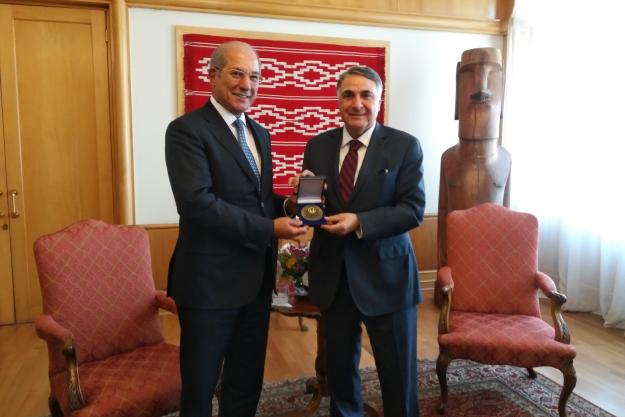
OPCW Director-General Ahmet Üzümcü (left) and Chilean Deputy Secretary of Foreign Affairs Edgardo Riveros Marín.
THE HAGUE, Netherlands — 27 September 2017 — The Director-General of the Organisation for the Prohibition of Chemical Weapons (OPCW), Ambassador Ahmet Üzümcü visited Santiago Chile on 25 and 26 September. During the visit the Director-General met Under-Secretary for Foreign Affairs, H.E. Edgardo Riveros Marín; Director General for Foreign Policy of the Ministry of Foreign Affairs, H.E. Mr Milenko E. Skoknic; and the Advisor to the Ministry General Secretariat of the Presidency, Mrs Antonia Urrejola. In his meetings he underscored the need for the full national implementation of the Chemical Weapons Convention (CWC) and the preservation of the norm against chemical weapons. The Director-General was accompanied by the Permanent Representative of Chile to the OPCW, H.E. Ms Maria Teresa Infante.
In meetings the Director-General briefed the Chilean authorities about the progress and challenges related to the implementation of the CWC, including OPCW activities in Syria and measures to prevent the use of chemical weapons by non-State actors.
Chilean officials reiterated their country’s continued commitment to the goals of the CWC and the activities of the OPCW.
In the presence of the Under Secretary of Defence, Mr Marcos Robledo Hoecker, the Director-General inaugurated the Stakeholders Forum for States Parties in Latin America and the Caribbean on the Adoption of National Implementing Legislation on the CWC on 26 September. In his keynote address, he spoke about the contributions of the OPCW to global peace and security as it marks its twentieth anniversary. Ambassador Üzümcü stated, “As the destruction of military stockpiles nears completion, the need for national implementation has never been greater. In particular, the threat of toxic chemicals being used as weapons by non-state actors is no longer theoretical, but rather a reality”. He highlighted that without domestic penal legislation related to the CWC, “violations may go unpunished and compliance may suffer”.
The Director-General expanded on the security theme later that day in his speech during the conference titled: “OPCW’s Role in New International Security Scenarios: the Syrian Experience”, organised by the Chilean Ministry of Foreign Affairs. Senior officials, diplomats and students from the Diplomatic Academy attended the lecture.
Ambassador Üzümcü expressed the need to maintain international norms, including the norm against chemical weapons: “[T]he preservation of the norm is critical because when it is breached without accountability, impunity is born.” He recalled the recent use of chemical weapons in Syria and reminded all that “the international community has forcefully condemned any use of chemical weapons by anyone under any circumstances”.
The Director-General was interviewed by the second largest Chilean newspaper, La Tercera.
Background
Chile became party to the Chemical Weapons Convention (CWC) in 1997 and has been an active supporter of the CWC though both financial and in-kind contributions.
As the implementing body for the Chemical Weapons Convention, the OPCW oversees the global endeavour to permanently eliminate chemical weapons. Since the Convention’s entry into force in 1997 – with its 192 States Parties – it is the most successful disarmament treaty eliminating an entire class of weapons of mass destruction.
To date, 96 per cent of all chemical weapon stockpiles declared by possessor States have been destroyed under OPCW verification. For its extensive efforts in eliminating chemical weapons, the OPCW received the 2013 Nobel Prize for Peace.
More Information
- “OPCW’s Role in New International Security Scenarios: the Syrian Experience” Statement by Ambassador Ahmet Üzümcü, Director-General OPCW At The Chilean Ministry of Foreign Affairs Santiago 26 September 2017
- Remarks by the Director-General at the Stakeholders Forum For States Parties In Latin America And The Caribbean (GRULAC) on the Adoption of National Implementing Legislation on the Chemical Weapons Convention
- OPCW Fact Sheets
